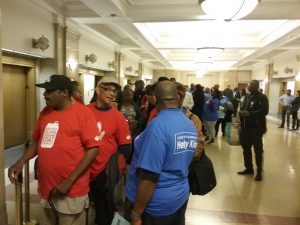Cook County committee will review tax on sugary drinks
By Kevin Beese Staff Reporter — September 19, 2017
Individuals line up to give testimony in favor of Cook County’s Sweetened Beverage Tax during last week’s County Board meeting. Interest groups on both sides of the issue are expected to spend money on ads aimed at swaying public opinion up until an Oct. 11 vote on possible repeal of the tax. (Photo by Kevin Beese/Chronicle Media)
A possible repeal of Cook County’s Sweetened Beverage Tax will not be decided until next month and ad-related spending from deep-pocketed interest groups on both sides of the issue is unlikely to fizzle during that time.
County Board members opted to send the proposed repeal to the county’s Finance Committee for consideration. Right now, the Finance Committee is next scheduled to meet at 10 a.m. Oct. 11, just prior to the next County Board meeting.
A hearing on the matter could be called a day sooner, according to Commissioner John Daley, head of the Finance Committee.
“I’ve committed as I’ve always done to have a hearing on any item that goes to the Finance Committee … There will be a hearing. I think it might be a separate date than the board meeting,” Daley said when the repeal vote was pulled from the County Board’s agenda at last week’s meeting.
The Finance Committee chair said he looks forward to hearing from residents and other elected officials regarding the proposed tax repeal.
Opponents of the tax on soda and other sweetened drinks simply did not have the votes in hand to get the repeal passed at last week’s County Board meeting.
“Ultimately, nobody wanted an up or down vote more than myself, with the exception of nearly 90 percent of the constituents who oppose this regressive tax,” Commissioner Sean Morrison, who sponsored the repeal legislation, said at last week’s board meeting. “I realize that there is no political will here today to take up a repeal vote and out of respect for the process and to ensure that this board does vote on the repeal ordinance, which will be on Oct. 11, I am going to refer this to the Finance Committee.”
Morrison said opponents of the tax will make sure the potential repeal process is followed to the letter of the law and that information about the tax provided to the board will be “honest, clear and accurate.”
Commissioner Larry Suffredin asked that the county’s chief financial officer provide information to board members prior to that Finance Committee hearing on what repealing the tax would mean to the county budget.
The issue has brought a rash of radio and television ads aiming to sway public opinion on the matter. Businessman, politician and philanthropist Michael Bloomberg, ranked the sixth richest person in the world with an estimated net worth of $53 billion, has poured money into support of the tax, saying children’s health is as stake.
The American Beverage Association, a trade group that represents the soda industry, has created the Can the Tax organization fighting the one-cent-per-ounce county tax on sweetened beverages, which went into effect in August. It contends that jobs are at stake in the beverage industry and at supermarkets and restaurants, if the tax is allowed to stand.
For more than two hours last week, people on both sides of the issue gave their testimony before county commissioners.
Mary Elsner, director of obesity prevention initiatives for the Illinois Chapter of the American Academy of Pediatrics, said research has shown that being obese or overweight is linked to 13 different forms of cancer.
“Treatment of obesity-related chronic conditions is already costing taxpayers $200 million per year and that is expected to grow,” Elsner said.
She said the price tag of the sweetened beverage tax is much smaller than “the staggering medical costs that all county taxpayers will endure shortly if nothing is done to stop obesity and its chronic conditions.”
Audrey Wheeler, a nurse in the Head Start program for 28 years, said drinking too much soda can cause a host of dental problems, including gum disease, tooth decay and cavities, and health issues.
“Let us stop the sugar that is going inside of our bodies today and showing up in sicknesses in the inside of our bodies, in diabetes and heart disease,” Wheeler said.
Tim Banks, the director of business operations for four Culver’s restaurants, said unintended consequences of the Sweetened Beverage Tax are putting the county’s fiscal health at risk.
“The tax moves sales out of Cook County and, therefore, lowers tax revenue instead of increasing it,” Banks said. “The stated goal of this tax is to influence the choice of what beverage our customers purchase, but unfortunately, it also influences the choice of what town they buy it in. This tax runs the risk of shifting that purchase to a similar restaurant outside of Cook County.”
Mary Werner, mayor of Worth, said that the tax is hurting the 10,800 residents of her village on a daily basis.
“Ours is a small, middle-class, friendly village that has no industry, no manufacturing and no big-box stores,” Werner said. “We rely on a Fairplay (Foods) grocer, a Family Dollar, CVS and Walgreens for sales tax revenue that provides essential services like the police and fire protection.”
She said because of the tax many of the residents of her south suburb are shopping outside of Worth, heading 20 minutes to Will County or Indiana, not just for soda but other items as well.
“They are so mad, and so angry, and so fed up with the taxes in Cook County, they are doing all of their shopping (there); and as long as they are there, they are buying their gas too,” Werner said.
Read the current issue of the Cook County Chronicle
Free subscription to the digital edition of the Cook County Chronicle
— Cook County committee will review tax on sugary drinks —



